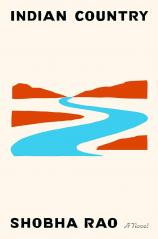Indian Country
Review
Indian Country
Shobha Rao's INDIAN COUNTRY is one of those books that makes it difficult for a reviewer to know where to start, given that it incorporates so many disparate and intertwined elements, all of which contribute to a rich and meaningful whole.
So perhaps I'll start where Rao does, with an epigraph from Laura Ingalls Wilder's Little House on the Prairie, which is exactly what sprang to mind for me when I saw the book’s title. Wilder, of course, was referencing Indigenous peoples when she wrote about "Indian country." That's also the kind of "Indians" most of the white residents of rural Montana, where Rao’s book is largely set, would think of first if they heard that term.
Rao, however, juxtaposes the Native Americans who live in Montana (and throughout the United States) with a young couple from the country of India who find themselves there as well. Sagar, an engineer who specializes in dam removal projects, was betrothed to Janavi's older sister. But through a rapidly unfolding set of circumstances, Janavi grudgingly agrees to marry him instead. Adding to her sense of emotional whiplash --- which includes abandoning a career she loves, working with impoverished children in her home city of Varanasi in northern India --- she discovers belatedly that marrying Sagar also means following him to Montana, where he's taken a job as the lead engineer on a dam removal project on the Cotton River.
"Rao exhibits stunningly controlled prose throughout the book.... Readers just may find themselves highlighting or underlining passages to return to later, and book clubs will find no shortage of topics to discuss here."
Janavi and Sagar, still strangers to one another when they move halfway across the world, must navigate their uncertainties together while also attempting to familiarize themselves with a new culture and a wildly different landscape. The one thing that their old home has in common with the new one is the centrality of a river. Janavi's home city of Varanasi is a major pilgrimage site for devout Hindus hoping to immerse themselves in the Ganges or to be cremated alongside it.
The Cotton River, although certainly nowhere near as significant as the Ganges, is also sacred in some ways, which is one of the reasons why a Native advisor, Renny, has been brought on to work as a consultant on the dam removal project. The Cotton River runs near a historic Indigenous burial site, and Renny wants to ensure that the site is not threatened when the dam is removed. Although Sagar has been trained in the safest methods for dam removal and the Native community supports returning the river to its natural state, some of the local white residents --- including the mayor --- are opposed to the removal, setting up a tension that Sagar didn't even know he was walking into. When Renny's body is found at the base of the dam, the mayor and others are quick to blame the dam removal efforts for what appears to be an accidental drowning. But Sagar and Janavi aren't so sure.
It's at this point that the novel shifts gears and becomes something of a murder mystery, as Sagar and Janavi --- propelled not only by their genuine desire to seek justice for Renny, her young daughter and her community, but also by the impending loss of their visas if Sagar loses his job --- join forces to find the answers that the local government seems unwilling to acknowledge.
This overview barely scratches the surface of INDIAN COUNTRY, which is also a sweeping historical epic that stretches across centuries and continents, as Sagar and Janavi's contemporary story is interspersed with short and often tragic vignettes set along both the Ganges and the Cotton River. Many of them revolve around white colonists failing to understand the landscape, climate, culture and wildlife of where they've found themselves. The result is a textured portrait of a place and the way that the echoes of history continue to reverberate.
Rao exhibits stunningly controlled prose throughout the book. Each sentence, particularly those in the historical vignettes, is exquisitely composed for maximum impact. Readers just may find themselves highlighting or underlining passages to return to later, and book clubs will find no shortage of topics to discuss here. From the violent history of colonialism to ongoing issues, like the disappearance and murder of Native women, to the bonds of sisterhood and the unpredictability of romantic relationships, opportunities to explore this richly hued novel feel as endless and expansive as the Montana horizon and as timeless as an ancient river.
Reviewed by Norah Piehl on August 16, 2025
Indian Country
- Publication Date: August 5, 2025
- Genres: Fiction
- Hardcover: 432 pages
- Publisher: Crown
- ISBN-10: 0593798953
- ISBN-13: 9780593798959




